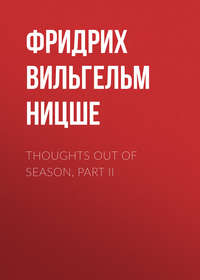Sadece Litres'te okuyun
Kitap dosya olarak indirilemez ancak uygulamamız üzerinden veya online olarak web sitemizden okunabilir.
Kitabı oku: «Thoughts Out of Season, Part II», sayfa 5
Bir şeyler ters gitti, lütfen daha sonra tekrar deneyin
Türler ve etiketler
Yaş sınırı:
12+Litres'teki yayın tarihi:
28 eylül 2017Hacim:
200 s. 1 illüstrasyonTercüman:
Telif hakkı:
Public Domain